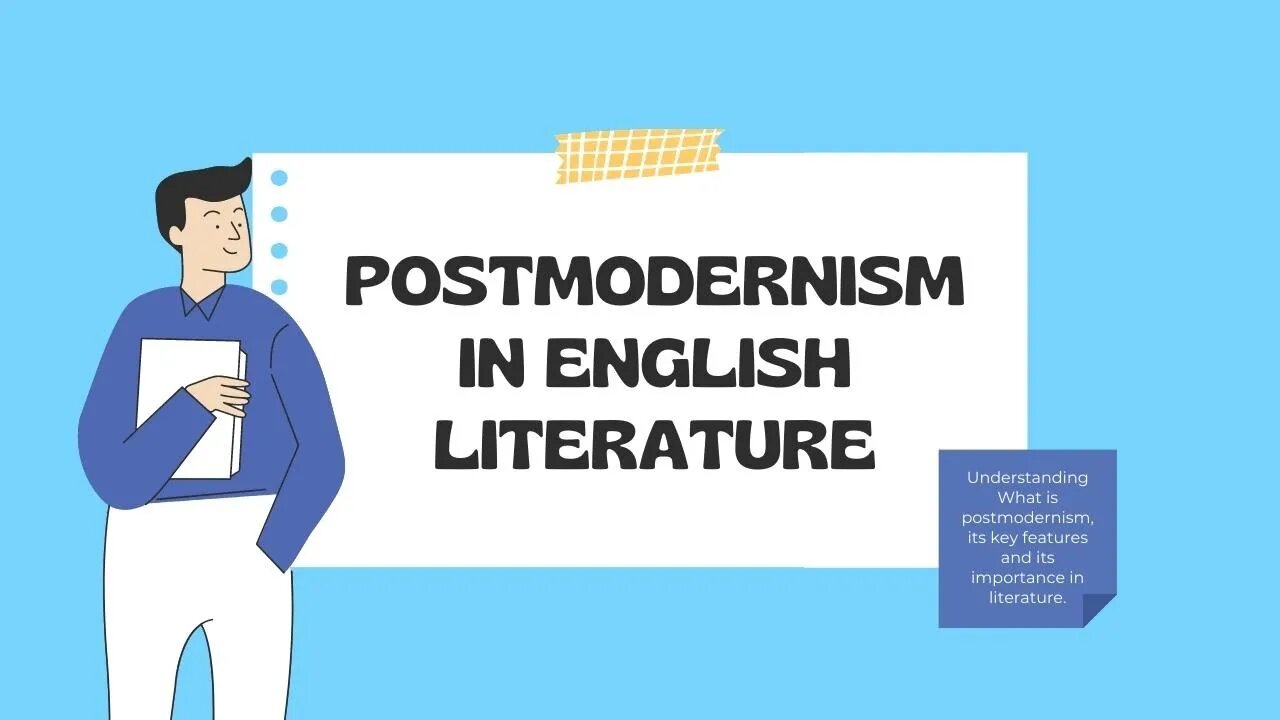Premium Only Content

Postmodernism in English Literature
Welcome to our explainer video on Postmodernism in English Literature. Today, we'll take a journey through the world of postmodernism, exploring its key features and impact on English literature. So, let's dive in!
Postmodernism is a movement that emerged in the mid-20th century, challenging traditional ideas and approaches to art, literature, and culture. In English literature, postmodernism brought about significant changes in the way stories were told and meaning was conveyed.
One key feature of postmodern literature is the blurring of boundaries. Postmodern writers often mix different genres, styles, and narratives, creating a sense of unpredictability and playfulness. They may incorporate elements of fantasy, science fiction, and historical fiction into their works, making it difficult to categorize them into a single genre.
Another characteristic of postmodernism is the use of intertextuality. This means that postmodern writers refer to and draw inspiration from other literary works, popular culture, or historical events. They may include references to famous books, movies, or even advertisements, creating a complex web of interconnected ideas and meanings.
Postmodernism also challenges the notion of a fixed and objective truth. Postmodern writers often question and deconstruct traditional narratives, exposing the relativity of meaning. They may present multiple perspectives, unreliable narrators, or fragmented narratives to reflect the complexity and subjectivity of human experience.
One important figure in postmodern English literature is the renowned author, Salman Rushdie. In his novel "Midnight's Children," Rushdie employs magical realism and a nonlinear narrative to explore the history and identity of India. This blending of reality and fantasy, along with the use of unconventional storytelling techniques, exemplifies the essence of postmodern literature.
Postmodernism in English literature has had a profound impact on readers and writers alike. It encourages us to question established norms, challenge traditional storytelling techniques, and embrace the diversity of perspectives. Postmodern literature invites us to engage actively with the text, interpreting and reinterpreting it in our own unique ways.
So, in conclusion, postmodernism in English literature is a movement that pushes the boundaries of storytelling, blurring genres, incorporating intertextuality, and challenging fixed truths. It encourages readers to embrace ambiguity and actively participate in the creation of meaning.
We hope you enjoyed this journey into the world of postmodernism in English literature. Remember, literature is a dynamic and ever-evolving art form, reflecting the complexities of our society and challenging our understanding of the world. Thank you for watching!
-
 14:23
14:23
Degenerate Jay
4 hours ago $0.45 earnedPeople Forgot What Metal Gear Solid Is?
24.2K5 -
 1:01:23
1:01:23
FamilyFriendlyGaming
17 hours ago $3.49 earnedCat Quest III Episode 14
37.3K -
 3:16:59
3:16:59
RG_GerkClan
6 hours ago🔴LIVE - Dominating One Raid at a Time - Escape From Tarkov - Gerk Clan
33.3K1 -
 1:49:43
1:49:43
Game On!
15 hours ago $2.27 earnedNFL Experts Top 10 Super Bowl Props!
27.1K2 -
 28:31
28:31
SB Mowing
1 day agoSiblings FEUD went so far the grass grew TALLER THAN THE HOUSE
80K20 -
 26:32
26:32
Stephen Gardner
17 hours ago🔥Tulsi Gabbard DROPS BOMBSHELL Obama Secret during hearing!
85.1K143 -
 4:42
4:42
SeasonofMist
5 months ago $0.19 earnedSYLVAINE - Dagsens Auga Sloknar Ut (Official Music Video)
3.87K -
 31:54
31:54
Jamie Kennedy
12 hours agoThe "Tolerant Left" is Getting Exposed
5.45K2 -
 1:00:39
1:00:39
Weberz Way
18 hours agoDEI NEEDS TO DIE, ANOTHER PLANE CRASH, & MAJOR TARIFFS BEING IMPOSED
2.43K2 -
 14:15
14:15
Ethical Preparedness
20 hours agoSecret Apocalyptic Pain Killing Weed that Big Pharma Tries to Hide from You -Post Collapse Medicine
1.84K4